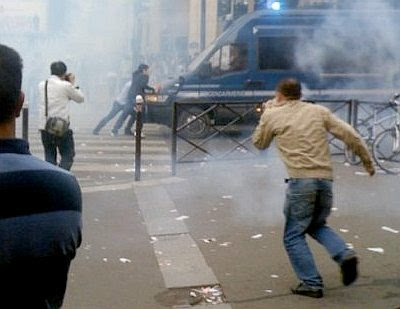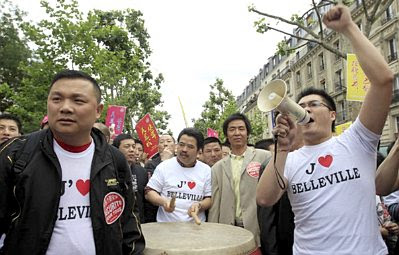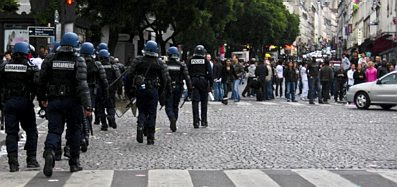
One of the ugly little secrets of Multiculturalism is the problem of violence between different non-white immigrant ethnic groups.
According to politically correct orthodoxy, all ethnic violence and crime may be ascribed to the racism of the majority white population. However, when “brown-on-brown” clashes occur, blaming the evil white man is a stretch, even for the most ardent multiculturalist. Somehow whites — via the overarching racist society they have created and dominate — are able to pit different ethnic groups against each other. That’s the Left’s story, and they’re sticking to it.
In London the Jamaican gangs are at war with the Pakistanis. In L.A., the blacks and the Mexicans clash repeatedly. Sometimes even different Muslim groups fight against one another.
The preferred victim for “youths” may be a member of the indigenous white population, but they will take any target of opportunity that happens along.
Belleville is a culturally enriched suburb of Paris, and, like most of the banlieues, its population is predominantly Muslim. However, there is a substantial Chinese minority in Belleville, and because the Chinese are relatively well-off and not always protected, they are favored targets for youthful muggers and thieves.
As immigrant groups go, the Chinese are generally peaceful and law-abiding. Last weekend they mounted a demonstration in Belleville with the theme “Sécurité Pour Tous” (“Security for All”) to protest the persistent violence of Muslim youths against their community, and the apparent indifference of the police to what is happening. Their rally was well-organized, orderly, and initially non-violent.

However, at the end of the event, a “youth” stole a Chinese woman’s purse and ran off with it. This was exactly what the crowd had been protesting, and for some of the protesters it was the last straw. They confronted the police, overturned cars, broke windows, and had to be dispersed through the use of teargas.
It was a most un-Chinese reaction to provocation, and demonstrates the extremity of their situation in Belleville.
The article below, which gives an account of what happened last Sunday and the background behind the demonstration, is taken from Le Quotidien du Peuple (my translation). The photos were borrowed from anthropologie du présent, Chine informations, and Alice in the land.
Le Quotidien du Peuple is a news organ of the Chinese community in France, and remains well within the acceptable politically correct boundaries its approach to the issue of “youth” violence in France. Nevertheless, an outline of the problem can easily be discerned from this report:
To preserve the rights and interests of the Chinese community in France, will the shot fired in Belleville be the last?
On June 20, tens of thousands of people from the Chinese community living in Paris marched in the Belleville district of the 19th and 20th arrondissement in Paris, and their demands were for “security” and “non-violence.” This demonstration was the detonation of several shots fired on June 2. That day there was a banquet at a restaurant in Belleville for the wedding of a young couple from China. But several guests were assaulted and attacked at the entrance of the restaurant by youths of African and Maghrebian origin who suddenly tore up and removed anything they could carry to throw at them. In the face of this situation, A Wu, a young Chinese man invited to the banquet, pulled a pistol from his pocket and shot and wounded the criminals. Knowing that his ill-considered actions violated French law, the young Chinese man immediately turned himself over to the French police, who had stood aside and allowed the bandits to act, and he gave them his weapon.
A Wu, who goes by the name Zhong Shaowu, is a young Chinese originally from Wencheng in Zhejiang Province, and at the moment is still locked in the Paris police detention center. It seems the police have no interest in any assault and theft in which the victims were ethnic Chinese; what interests them is where A Wu acquired the weapon he carried to defend himself against bandits and his motive for firing the shot, because according to them “There’s a little Mafia behind that.”
Regarding the case of Mr. Zhong, opinions are very diverse. We have no comment on that because this is not yet clarified, and it is the Paris police and the Chinese Consulate that are handling the problem. The most important thing for us is that the shot was fired once for all the long-suppressed indignation and anger, repressed and compressed in the hearts of the inhabitants of the Chinese community living in France, and especially the inhabitants of Chinese origin who settled in the low-rent housing district of Belleville in the 19th arrondissement of the French capital, who work hard with diligence to be able to make a better life in France. But for many years they have suffered a lot of provocations and attacks by gangs of young thugs who infest the neighborhood. Like most Chinese people engaged in and dedicated to small businesses, at the end of the day they often carry amounts of cash, and that is why they have become a favored target for the mob, the rogue and the scoundrel.
The demonstration on Sunday, June 20 began in the afternoon. In its preparation and organization it reflects the great differences of viewpoint among various parts of the Chinese community regarding the problem of ethnic integration. The diverse and different thoughts it arouses in society may be useful for us to know in order to decide the direction to take to best address the security issues of ethnic Chinese people.
1. Why should we not consider the problem of the lack of security among the Chinese in Belleville as a single ethnic conflict?
– – – – – – – – –
In all criminal cases of violence aimed to seize the property of others, most victims always carry cash, have little ability to defend themselves, have no companions to help and defend them, are mostly women or the elderly, while those of Chinese origin who speak little or no French, and have difficulties seeking help and communicating with the organs of justice. Given that a Chinese person is industrious, hard-working, able to endure suffering and hardship, and is very skillful in management and operations, he often has income, while his gentle nature — quiet and affable because it prefers to endure the troubles and hardships and financial losses to avoid misfortune — makes him in the eyes of the criminal a fearful and docile lamb who does what he is told. In France, a number of immigrants, and especially the younger generation of immigrants from francophone African countries and the Maghreb countries, often engage in criminal acts to satisfy their needs, and this is a puzzle for French authorities who do not know which way to turn. Ethnic Chinese despise these people, and are often subject to their acts of theft, assault and robbery.
One thing we must not forget is that these people are very different from Chinese, since many of them have lived and grown up from childhood in an environment of violence, and they consider the forcible oppression of the weak as a rule of survival. They bully, mistreat, humiliate and brutalize not only ethnic Chinese, but also the weaker members of their own ethnic group, so that even the women, the elderly and children of African and North African origin, and also some French people, are often the object of their abuse and humiliation. The purpose of their rape and plunder is to seize the fruits of labor of others and make a living without working. For them, the only thing that merits consideration is the best way to seize the property of others. As for me (the author of this article), I have friends of North African origin, and they are modest, gentle, reasonable, hardworking, and diligent workers like any member of a civilized society; this is why it is completely arbitrary and subjective to try to determine the moral quality of any person by considering only his ethnicity.
Contrary to the imagination of some Chinese, in which the incident developed into a war between the Chinese community and other local immigrant communities, such a situation will not benefit anyone, and will provide no solution to the problems that exist, and will be positive only for hooligans, ruffians, and criminals who will be glad to manipulate racism and ethnic awareness in order to avoid prosecution, and this will be the only escape for them that will allow them to avoid embarrassment and trouble. In contrast, we must use the model of relations between associations and organizations, and it is up to Chinese organization to act first to contact different ethnic communities to unite and gather all the residents of nearby neighborhoods, thereby reducing as much as possible hiding places for criminals, and that is how the Chinese can make use of their wisdom and intelligence.
2. Why should the overseas Chinese and foreigners of Chinese origin living in foreign territory make their claims and demands known, understood and accepted by the general public and the major social classes of the country in which they reside?
The overseas Chinese nationals and overseas Chinese have a heart that beats in unison with the homeland and this is naturally the choice of feeling, but nobody should forget that they must respect the sovereignty justice of the country hosting them, and when their rights and interests are encroached, then they must seek the help and protection of the courts of the host country, and must also know how to harness the power of local media to increase the weight of their claims so that they are taken into account by the leaders of the country involved as well as the international community, and ensure that their actions can gain moral support. Regarding this, the Jewish community is very well behaved and has conducted its affairs well. I remember that in 2007 the Jewish community in Paris organized a large demonstration with a number of participants that was not counted in tens of thousands, or hundreds of thousands, but reached over one million. The mission of the Jewish community was to honor the memory of Ivan, a young Jew murdered by bandits from the Ivory Coast, received the full support of major French media, and even non-French Jews participated in the demonstration which began at the Place de la Republic and ended up at the Place de la Nation. In comparison, there were only tens of thousands of Chinese who participated in our “anti-violence” event. The route was not only short and demonstrators traveled the streets to remote places where there are few people, and there were very few representatives of other ethnic groups, it seems that our event is much less popular than the one organized by Jews three years ago. During the course of the latter, there were several small skirmishes between young Muslims and Jewish youth (Ivan’s attacker was a young Ivorian who practiced Islam), but they were quickly suppressed by security groups dispatched locally by the organizers of the event with the help of the police.
What impressed me most deeply was the high degree of self-discipline of the Jewish community when several Jewish extremists began to burn the headscarf emblematic of the Palestinian Liberation Movement and fight with young North Africans who followed the rally. I acted instinctively, taking my camera. At that time, a young engaged couple Jews came to me and begged me in tears while saying, “Mr. Journalist, please do not include this picture in your news article, because these young Jews are a minority and they do not represent the mainstream of the Jewish community. We do not want our event to cause ethnic conflict.” And at exactly that moment, members of the group enforcing discipline and safety intervened to disperse the antagonists and end the conflict that had just kindled.
Subsequently the local press published reports on the event and there were very few negative comments about it, which was quite consistent with the initial goal adopted by the organizers. The Jewish community is deeply rooted in French society, so it is impossible for the Chinese community to fully and completely follow its example, but can refer to it as a model for the organization of the event.
3. Errors that overseas Chinese must avoid making when they are struggling for their rights and interests.
During the demonstration on Sunday there were some problems that I think were inappropriate and inconceivable.
First of all, the principle of “unity of all ethnic groups to resist and combat illegal activities” was not translated into the event, while there was too much emphasis on the participation of ethnic Chinese while failing to invite the largest number of representatives of other ethnicities. For example, the French also suffer from the woes inflicted by the thugs and criminals, and they should have been invited to this event, while most of the population of Belleville became mere spectators and not participants, which significantly reduced the impact of this popular demonstration.Then, regarding the organization of the event, even though there were no major problems, during the final stage, when during the evacuation of protesters there were quarrels, disputes, and altercations between Chinese youth and youth of North African origin, and at the same time a woman of Chinese origin became a victim of theft when her handbag was snatched and disappeared in the blink of an eye, causing a conflict with a tendency to escalate. For when organizers left the place, some young people of Chinese origin acted against the police who used teargas to try to disperse the demonstrators, and a dozen were arrested and detained.
On the other hand, many held aloft and waved Chinese flags throughout the event, and some protesters said that “the Chinese Embassy is supporting the event …” when in reality in such cases, Chinese embassies abroad always act with caution because of the sovereignty of justice of the country involved. While preserving and protecting the legitimate rights and interests of Chinese citizens, we must avoid interfering in the judicial independence of the country at issue. A small number of protesters who do not understand this act with abandon, adding a negative aspect and a sense of hostility which is absolutely counterproductive for the success of diplomatic efforts, and, on the contrary, these factors and this feeling cannot provide any successful resolution of the problems.
Hopefully, the claims and demands of the Chinese community in France about its safety in this country will be taken into account by the French government. But, on the other hand, Chinese citizens in France and French people of Chinese origin should make efforts to strengthen communication and understanding with leading French social classes, because the emergence of the problem of insecurity in ethnic conflict is in nobody’s interest, and is something that nobody wants to see or live through.
— By Luo Hao

Note: My French is rusty and inadequate, and I welcome correction if I have missed the sense of the text in any part of the above translation.
Hat tips: For the article and some of the photos, Cyber-résistant; for the rest of the photos, Steen.



 Faisal Shahzad, the would-be Times Square bomber, has pleaded guilty to all ten counts against him, including weapons and terrorism charges, some of which carry a mandatory life sentence. Mr. Shahzad told the judge that he is a soldier in a Muslim war against the United States to punish it for its attacks on Muslim lands.
Faisal Shahzad, the would-be Times Square bomber, has pleaded guilty to all ten counts against him, including weapons and terrorism charges, some of which carry a mandatory life sentence. Mr. Shahzad told the judge that he is a soldier in a Muslim war against the United States to punish it for its attacks on Muslim lands. In a broadcast of the Dutch TV program “
In a broadcast of the Dutch TV program “


 And he links to Alibekov’s work,
And he links to Alibekov’s work, 
